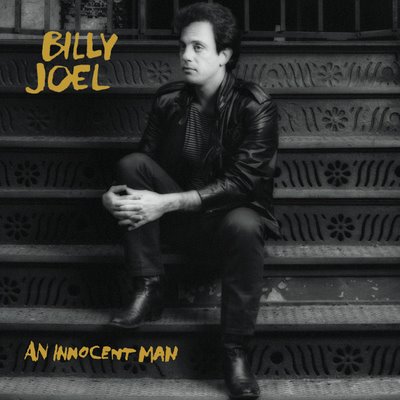
An Innocent Man (1983)

1. Easy Money
2. An Innocent Man
3. The Longest Time
4. This Night
5. Tell Her About It
6. Uptown Girl
7. Careless Talk
8. Christie Lee
9. Leave a Tender Moment Alone
10.Keeping the Faith
In the wake of 1982’s The Nylon Curtain—a meticulously constructed, emotionally weighty album considered by many to be Joel’s artistic zenith—few would have predicted that his follow-up, released less than a year later, would pivot so dramatically in tone and intention. Yet, An Innocent Man represents just that: a complete 180-degree turn. Where The Nylon Curtain labored under the weight of its themes and production, An Innocent Man was a breezy, nostalgic homage to the doo-wop and early R&B that shaped Joel’s musical adolescence.
To describe it as a “throw-off” might be technically accurate—Joel himself has hinted at the record’s spontaneity—but the term belies the sheer skill and affection with which it was assembled. While lesser artists might use retro stylings as a gimmick or an escape, Joel invests them with sincerity and polish. The arrangements are deft, the performances exuberant, and crucially, the songwriting stands on its own.
It’s no coincidence that this creative pivot coincided with Joel’s highly publicized romance with Christie Brinkley, soon to be his wife. Her presence is felt throughout the record, not only as lyrical muse but also visually—in the now-iconic Uptown Girl video. Whether or not this relationship catalyzed the album’s joyful tone, it certainly mirrored the lightness that permeates the grooves.
Much has been made of how effortlessly Joel recreates the early ‘60s sound. Tracks like Tell Her About It and Christie Lee could be mistaken for unearthed Brill Building gems. Others—The Longest Time, Leave a Tender Moment Alone, and Keeping the Faith—capture the spirit of the era without resorting to imitation. It’s a balancing act of reverence and originality that few have managed with such success.
Commercially, the album was a juggernaut: six charting singles, an achievement unmatched in Joel’s discography. If radio fatigue set in around 1984, it was only a testament to the record’s ubiquity. Curiously, the standout This Night didn’t chart, though its borrowing of a Beethoven motif—something Joel candidly acknowledged—made it a minor classic in its own right.
Not everything lands with equal grace. Easy Money, intended as a high-energy opener, leans heavily into a soul party style that jars with the album’s overall feel. Christie Lee, meanwhile, feels undercooked—an impression compounded by the later release of a superior alternate take on the patchy My Lives. Still, these misfires are minor blemishes on an otherwise remarkable collection.
Viewed in context, An Innocent Man marked the crest of a wave. Joel had released nearly an album a year for a decade; the creative well, while not yet dry, would begin to ebb. Subsequent releases would taper off in both frequency and, some argue, quality. But in 1983, with An Innocent Man, Joel stood at a kind of creative apex—looking backward to the music of his youth, and in doing so, adding another milestone to his remarkable career.
Back To Main Page
Go To Next Review